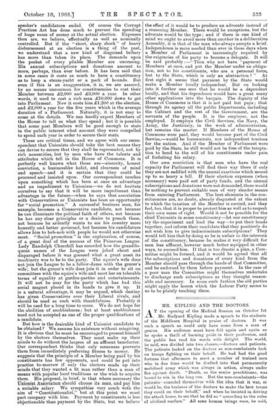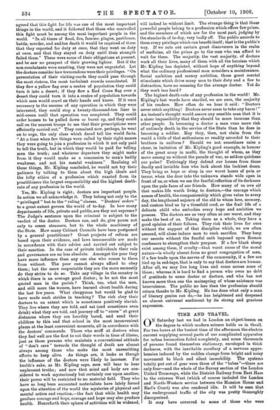MR. KIPLING AND THE DOCTORS.
AT the opening of the Medical Session on October 1st Mr. Rudyard Kipling made a speech to the students of the Middlesex Hospital in praise of doctors. It was such a speech as could only have come from a man of genius. His audience must have felt again and again as be spoke a thrill of burning pride in their profession, and the public has read his words with delight. The world, he said, was divided into two classes,—doctors and patients. The patients looked on the doctors as non-combatants look on troops fighting on their behalf. He bad had the good fortune that afternoon to meet a number of trained men who in due time would be drafted into that permanently mobilised army which was always in action, always under fire against death. "Death, as the senior practitioner, was bound to win in the long run. But the non-combatants—the patients—consoled themselves with the idea that it was, or would be, the business of the doctors to make the best terms they could on their behalf," and when he insisted in driving the attack home, to see that lie did so " according to the rules of civilised warfare." All sane human beings were, he said, reed that this fight for life was one of the most impertant things in the world, and it followed that these who controlled this fight must be among the most important people in the world. "In all times of Amid, fire, famine, plague, pestilence, battle, murder, and sudden death it would be required of them that they reported for duty at once, that they went on duty at once, and that they stayed on duty pistil their strength failed them." These were some of their obligations at present, end he saw no prospect of their growing lighter. But if the non-combatants were exacting, they were not ungrateful. Let the doctors consider bow tremendous were their privileges. "On presentation of their visiting-cards they could pass through the most riotous, the most turbulent crowds unmolested. If they flew a yellow flag over a centre of population they could turn it into a desert; if they flew a Red Cross flag over a desert they could turn it into a centre of population towards which men would crawl on their hands and knees. If it were necessary to the success of any operation in which they were interested, they could stop a twenty-thousand-ton liner in mid-ocean until that operation was completed. They could order houses to be pulled down or burnt up, and they could call on the nearest troops to see that their prescriptions were efficiently carried out." They remained now, perhaps, he went on to urge, the only class which dared tell the world facts. "At a time when few things were called by their right nameB they were going to join a profession in which it not only paid to tell the truth, but in which they would be paid for telling men the truth ; and whatever departure they might make from it they would make as a concession to man's bodily ,yeakneas, and not his , mental weakness." Realising all these things, Mr. Kipling concluded, he would net try their patience by talking to them about the high ideals and the lofty ethics of a profession which exacted from its practitioners the largest responsibility and the highest death- rate of any profession in the world.
Yes, Mr. Kipling is right; doctors are important people. In action we all acknowledge it. They belong not only to the " privileged " but to the " ruling " classes. "Doctors' orders " to a great extent govern the world of to-day. In how many departments of life, private and public, are they not supreme? The Judge's sentence upon the criminal is subject to the verdict of the doctor. Doctors can, and do, give pause not only to ocean steamers, but to the whole machinery of the State. How many Cabinet Councils have been postponed by a general practitioner ? Great projects of reform are based upon their evidence, and laws innumerable are made in accordance with their advice and carried out subject to their sanction. In the case of private individuals their rule and governance are no less absolute. Amongst the poor they have more influence than any one else who comes to them from without. The poor cannot always afford to obey them; but the more respectable they are the more earnestly do they strive to do so. Take any village in the country in which there is an average good doctor; is be not the most quoted man in the parish ? Think, too, what the men, and still more the women, have learned about health during the last few years. What clergyman but would be glad to have made such strides in teaching ? The rich obey their doctors to an extent which is sometimes positively slavish. They live where they are told, and eat (and sometimes even drink) what they are told, and journey off to " cures" at great distances, where they are horribly bored, and send their children to this and that school in the most inconvenient places at the least convenient momenta, all in accordance with the doctors' commands. Those who scoff at doctors when they feel well are the first to eat their words in time of illness, just as those persons who maintain a conventional attitude Of " don't care " towards the thought of death are almost always among those who make the most unremitting efforts to keep alive. As things are, it looks as though the influence of the doctors were likely to increase. For health's sake, as Mr. Kipling says, men will bear to bear unpleasant truths; and now that mind and body are con- sidered to work mysterieusly but certainly one upon another, their power will be restricted to no material field. They who have so long been accounted materialists have lately forced ,upon the attention of the world the mysteries of physical and mental action and reaction,—the fact that while, health may roduce courage and hope, courage and hope may also produce health. Henceforth their sphere of activities will be widened, will indeed be without limit. The strange thing is that these powerful people belong to a profession which offers few prize?, and the members of which are fur the most part, judging by the standards of to-day, very badly off. The public accords to them.every privilege which can benefit itself ; that is the public's way. If we rule out certain great discoverers in the realm of medicine, all the prizes go to the men who can afford to wait for them. The majority, the vast majority, of doctors work all their lives, many of them with all the heroism which Mr. Kipling has depicted, without hope of anything beyond what the ordinary professional man considers a maintenance. Social ambition and money ambition, those great mental stimulants which drive many men to their duty and a few to distraction, have no meaning for the average doctor. Yet do they work less hard ?
The highest death-rate of any profession in the world! Mr. Kipling's last words have startled, we are sure, the majority of his readers. How often do we hear it said : " Doctors never catch anything! Doctors never seem to take any harm ! " An instant's thought would assure any sensible man that it is a sheer impassibility that they should be more immune than other people. In becoming a doctor a man runs more risk of untimely death in the service of the State than he does in becoming a soldier. May they, then, not claim from the world a little of that enthusiasm so readily accorded to their brothers in uniform ? Should we not sometimes raise a cheer, in imitation of Mr. Kipling'a good example, in honour of the great army in mufti, the thought of whom, as they move among us without the parade of war, so seldom quickens our pulse? Untiringly they defend our homes from those deadly and invisible foes who lurk about the luckiest doors. They bring us hope or sleep in our worst hours of pain or terror, when the door into the unknown stands wide open in front of us, or when we see the fearful reflection of its darkness upon the pale faces of our friends. How many of us owe all that makes life worth living to doctors,r—the courage which comes of health, the companionship which gives value to every day, the lengthened sojourn of the old to whom love, memory, and custom bind us by a threefold cord, or the frail life of a delicate child who embodies every hope and ambition we possess. The doctors see us very often at our worst, and they make the best of us. Taking them as a whole, they have a good opinion of their fellows. They risk their lives for ours without the support of that discipline which, we are often assured, will alone induce men to such sacrifice. They keep our secrets without the fearful oath imposed upon Roman confessors to strengthen their purpose. If a few black sheep exist among them, if cruelty—that worst purse of the moral nature---is wholly absent from no great congregation of men, if a few trade upon the nerves of the community, if a few are tied up in red-tape, that is only to say that doctors are human. After all, we may live long lives and come across mane of those; whereas it is hard to find a person who owes no debt of gratitude to some doctor or doctors, and who has not known more than one the mainspring of whose existence was benevolence. The public no less than the profession should return thanks to Mr. Kipling. He has done what only a man of literary genius can do,—he has heightened and deepened an almost universal sentiment by its strong and gracious expression.















































 Previous page
Previous page